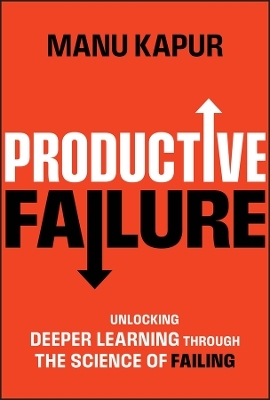
Productive Failure
Sybex Inc.,U.S. (Verlag)
978-1-394-21999-5 (ISBN)
Written by a leading global expert on human cognition, productive failure, and learning methods, Productive Failure shows you how to design the experience of failing. Research shows that repeated experiences of intriguing, constructive failure can help students (and our own children, and anyone else we lead) develop creativity and learn more deeply. When carefully curated, failure can become a signal for learning, not the noise detracting from it. The result? Learners gain a lifelong readiness to push themselves outside of their comfort zones, using setbacks as launchpads for learning and innovation.
The evidence-based principles in this book are powerful, not only in formal schooling contexts, but also for anyone taking charge of and designing their own lifelong learning. From learning a new language or skill to setting up goals that push you past your limits, this book unpacks the science of Productive Failure and describes design principles—and specific strategies built upon them—that let you harness Productive Failure for your own benefit.
Learn and understand the science of failure
Apply the research-based Productive Failure framework in classrooms, teams, groups, and organizational settings
Learn techniques like retrieval practice, generative problem-solving, motivational hacking, culture building, and so on to deepen learning experiences
Reach new levels of critical thinking, innovation, and success by making failure the norm, not the exception, and learning how to cope with it
This fascinating and actionable book is a must for educators, parents, managers, leaders, and anyone who needs to help others (or themselves) learn how to learn.
MANU KAPUR developed the theory of Productive Failure and applies it in classrooms and workplaces around the world to transform learning and growth. He is a Professor of Learning Sciences and Higher Education at ETH Zurich, Switzerland, and has spent the past two decades understanding the science of how people learn. His research has attracted substantial funding and media interest around the world, making him a sought-after keynote speaker, including two TEDx Talks. Manu has held prestigious visiting professorships and advisory roles globally, and his contributions extend across not only high-profile journals and conferences, but also impact educational policies and practices internationally. For more: www.manukapur.com.
Foreword xiii
Introduction: My Forays into Failure 1
Soccer Dreams 2
Struggling Through My Engineering Studies 3
Into the Classroom 5
Venturing into Academia 6
Finding the Cause and Its Solution 8
Connecting the Dots 10
Part I The Problem and Its Solution 13
Chapter 1 The Problems of Learning 17
Failing to Remember 19
Failing to Understand 22
Failing to Transfer 27
Chapter 2 The Solution: Productive Failure 35
Direct Instruction vs. Discovery Learning 37
Searching for a Problem 38
Designing for Failure 41
The Ideas of a Novice 43
Turning Direct Instruction on Its Head 47
Setting Up the Experiment 48
The Battle: Productive Failure vs. Direct Instruction 52
Part II The Science of Failure 59
Chapter 3 Activation 63
The Activation Spectrum 66
Failure-based Activation 69
Why Does Failed Generation Work? 77
Chapter 4 Awareness 91
From Socratic Dialogue to Tutoring 93
Intentionally Designing Impasses 94
When Intuition Failure Builds Awareness 97
Humbled By a Six Year Old 101
The Warmth Above the Clouds 104
In Awe of Awe 106
Chapter 5 Affect 109
The Zeigarnik Effect 110
The Need for Closure 113
Situational Interest and Curiosity 117
Mastery Orientation 127
Emotional Rollercoaster 131
Chapter 6 Assembly 139
Identify the Lego Blocks 141
Assemble the Lego Blocks 145
The Danger of Learning the Wrong Things Is. 159
Part III Designing for Productive Failure 165
Chapter 7 Designing for Others 167
Designing the Task 169
Designing the Participation 174
Designing the Social Surround 178
Iterate and Calibrate 181
Chapter 8 Designing for Self 185
Entering the Zone 185
Harnessing the Productive Failure Design Principles 187
Conclusion 205
References 211
Acknowledgments 221
About the Author 223
Index 225
| Erscheinungsdatum | 24.09.2024 |
|---|---|
| Verlagsort | New York |
| Sprache | englisch |
| Maße | 158 x 231 mm |
| Gewicht | 431 g |
| Themenwelt | Geisteswissenschaften ► Psychologie ► Allgemeine Psychologie |
| Geisteswissenschaften ► Psychologie ► Pädagogische Psychologie | |
| Geisteswissenschaften ► Psychologie ► Verhaltenstherapie | |
| Wirtschaft ► Betriebswirtschaft / Management ► Unternehmensführung / Management | |
| ISBN-10 | 1-394-21999-7 / 1394219997 |
| ISBN-13 | 978-1-394-21999-5 / 9781394219995 |
| Zustand | Neuware |
| Haben Sie eine Frage zum Produkt? |
aus dem Bereich


